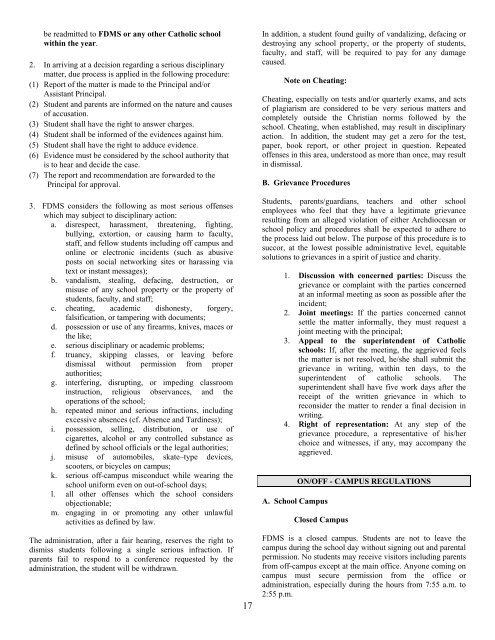FDMS Student's Handbook - Father Duenas Memorial School
FDMS Student's Handbook - Father Duenas Memorial School
FDMS Student's Handbook - Father Duenas Memorial School
You also want an ePaper? Increase the reach of your titles
YUMPU automatically turns print PDFs into web optimized ePapers that Google loves.
e readmitted to <strong>FDMS</strong> or any other Catholic school<br />
within the year.<br />
2. In arriving at a decision regarding a serious disciplinary<br />
matter, due process is applied in the following procedure:<br />
(1) Report of the matter is made to the Principal and/or<br />
Assistant Principal.<br />
(2) Student and parents are informed on the nature and causes<br />
of accusation.<br />
(3) Student shall have the right to answer charges.<br />
(4) Student shall be informed of the evidences against him.<br />
(5) Student shall have the right to adduce evidence.<br />
(6) Evidence must be considered by the school authority that<br />
is to hear and decide the case.<br />
(7) The report and recommendation are forwarded to the<br />
Principal for approval.<br />
3. <strong>FDMS</strong> considers the following as most serious offenses<br />
which may subject to disciplinary action:<br />
a. disrespect, harassment, threatening, fighting,<br />
bullying, extortion, or causing harm to faculty,<br />
staff, and fellow students including off campus and<br />
online or electronic incidents (such as abusive<br />
posts on social networking sites or harassing via<br />
text or instant messages);<br />
b. vandalism, stealing, defacing, destruction, or<br />
misuse of any school property or the property of<br />
students, faculty, and staff;<br />
c. cheating, academic dishonesty, forgery,<br />
falsification, or tampering with documents;<br />
d. possession or use of any firearms, knives, maces or<br />
the like;<br />
e. serious disciplinary or academic problems;<br />
f. truancy, skipping classes, or leaving before<br />
dismissal without permission from proper<br />
authorities;<br />
g. interfering, disrupting, or impeding classroom<br />
instruction, religious observances, and the<br />
operations of the school;<br />
h. repeated minor and serious infractions, including<br />
excessive absences (cf. Absence and Tardiness);<br />
i. possession, selling, distribution, or use of<br />
cigarettes, alcohol or any controlled substance as<br />
defined by school officials or the legal authorities;<br />
j. misuse of automobiles, skate–type devices,<br />
scooters, or bicycles on campus;<br />
k. serious off-campus misconduct while wearing the<br />
school uniform even on out-of-school days;<br />
l. all other offenses which the school considers<br />
objectionable;<br />
m. engaging in or promoting any other unlawful<br />
activities as defined by law.<br />
The administration, after a fair hearing, reserves the right to<br />
dismiss students following a single serious infraction. If<br />
parents fail to respond to a conference requested by the<br />
administration, the student will be withdrawn.<br />
17<br />
In addition, a student found guilty of vandalizing, defacing or<br />
destroying any school property, or the property of students,<br />
faculty, and staff, will be required to pay for any damage<br />
caused.<br />
Note on Cheating:<br />
Cheating, especially on tests and/or quarterly exams, and acts<br />
of plagiarism are considered to be very serious matters and<br />
completely outside the Christian norms followed by the<br />
school. Cheating, when established, may result in disciplinary<br />
action. In addition, the student may get a zero for the test,<br />
paper, book report, or other project in question. Repeated<br />
offenses in this area, understood as more than once, may result<br />
in dismissal.<br />
B. Grievance Procedures<br />
Students, parents/guardians, teachers and other school<br />
employees who feel that they have a legitimate grievance<br />
resulting from an alleged violation of either Archdiocesan or<br />
school policy and procedures shall be expected to adhere to<br />
the process laid out below. The purpose of this procedure is to<br />
succor, at the lowest possible administrative level, equitable<br />
solutions to grievances in a spirit of justice and charity.<br />
1. Discussion with concerned parties: Discuss the<br />
grievance or complaint with the parties concerned<br />
at an informal meeting as soon as possible after the<br />
incident;<br />
2. Joint meetings: If the parties concerned cannot<br />
settle the matter informally, they must request a<br />
joint meeting with the principal;<br />
3. Appeal to the superintendent of Catholic<br />
schools: If, after the meeting, the aggrieved feels<br />
the matter is not resolved, he/she shall submit the<br />
grievance in writing, within ten days, to the<br />
superintendent of catholic schools. The<br />
superintendent shall have five work days after the<br />
receipt of the written grievance in which to<br />
reconsider the matter to render a final decision in<br />
writing.<br />
4. Right of representation: At any step of the<br />
grievance procedure, a representative of his/her<br />
choice and witnesses, if any, may accompany the<br />
aggrieved.<br />
A. <strong>School</strong> Campus<br />
ON/OFF - CAMPUS REGULATIONS<br />
Closed Campus<br />
<strong>FDMS</strong> is a closed campus. Students are not to leave the<br />
campus during the school day without signing out and parental<br />
permission. No students may receive visitors including parents<br />
from off-campus except at the main office. Anyone coming on<br />
campus must secure permission from the office or<br />
administration, especially during the hours from 7:55 a.m. to<br />
2:55 p.m.


